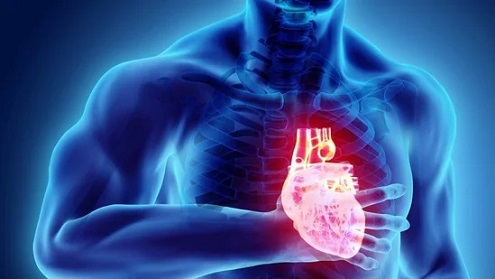BREAKING! Cardiology News: Study Discovers That A Molecule Called Brain-Derived Neurotrophic Factor (BDNF) Plays A Key Role In Heart Failure!
Cardiology News - Brain-Derived Neurotrophic Factor (BDNF) - Heart Failure Mar 31, 2023 2 years, 10 months, 2 weeks, 5 days, 1 hour, 25 minutes ago
Cardiology News: A new study by researchers from Johns Hopkins University Medical Institutions, Maryland-USA, Temple University, Pennsylvania-USA and University of Naples Federico II-Italy, has found that a molecule called brain-derived neurotrophic factor (BDNF) plays a key role in heart failure!

Heart attack survival rates have significantly increased thanks to better awareness and improved treatments. However, this has led to a growing number of individuals experiencing long-term effects on their heart function, particularly chronic heart failure, a condition where the heart gradually loses its ability to pump blood effectively.
The study team discovered a promising new therapeutic target that may lead to more effective treatments for heart failure.
The Role of BDNF in Heart Failure
The research focused on a molecule called brain-derived neurotrophic factor (BDNF). The scientists found that a loss of BDNF contributes to heart failure after a heart attack, also known as myocardial infarction (MI).
The study team demonstrated in animal studies that BDNF levels can be replenished therapeutically, which helps to prevent damage to the heart tissue and enables the heart to recover.
Dr Walter J. Koch, a leading cardiovascular expert, states that the identification of BDNF as a therapeutic target represents a significant advancement in the development of better treatments for heart failure.
The study also reveals for the first time that reduced BDNF production in the heart is linked to altered signaling of the β-adrenergic receptor (βAR) and that stimulating a protein called tropomyosin kinase receptor B (TrkB) increases BDNF levels in the heart.
The Study and Findings
The study team conducted experiments on mice to investigate the relationship between BDNF levels, TrkB stimulation, and heart function following a heart attack. They discovered that BDNF levels initially increased after ischemia (a temporary lack of blood supply to the heart) but then rapidly declined. Stimulation of TrkB restored BDNF levels and improved heart function post-ischemia.
The study team also found that BDNF enrichment in heart cells is driven by a specific subtype of βAR, known as β3AR.
This discovery has important implications, as drugs targeting βAR have been shown to protect patients against heart attacks, but the underlying mechanism has remained unclear.
Dr Nazareno Paolocci, a co-author of the study, told
Cardiology News reporters at TMN. “BDNF generation serves as another defense mechanism employed by heart cells to protect themselves against ischemia.”
Translational Implications and Future Research
While more research is needed to understand the interaction between TrkB and β3AR in BDNF production, the findings have immediate implications for potential treatments. Dr. Koch suggests that existing β3AR agonists (drugs that stimulate β3AR) could
be adapted for use in patients with chronic heart failure. Additionally, TrkB represents a promising target for the development of new heart failure therapies.
Study Abstract And Details
Brain-derived neurotrophic factor (BDNF) and tropomyosin kinase receptor B (TrkB) signaling play a role in brain and cardiac disorders. In neurons, stimulation of β-adrenergic receptors increases local BDNF expression. It remains unclear if this occurs in the heart in a pathophysiologically relevant manner, particularly in the β-adrenergic receptor-desensitized postischemic myocardium. It is also not completely understood whether TrkB agonists can counteract chronic postischemic left ventricle (LV) decompensation, a significant unmet clinical goal.
The study team performed in vitro experiments using neonatal rat and adult mouse cardiomyocytes, SH-SY5Y neuronal cells, and umbilical vein endothelial cells. The researchers evaluated the impact of myocardial ischemia (MI) in wild type, β3AR knockout, or cardiomyocyte-specific BDNF knockout (myoBDNF KO) mice in vivo (through coronary ligation [MI]) or in isolated hearts with global ischemia-reperfusion (I/R).
The study findings showed that in wild type hearts, BDNF levels increased early after MI (<24 hours) but dropped at four weeks when LV dysfunction, adrenergic denervation, and impaired angiogenesis occurred. The TrkB agonist, LM22A-4, counteracted these adverse effects.
Compared to wild type, isolated myoBDNF KO hearts exhibited worse infarct size/LV dysfunction after I/R injury and received limited benefits from LM22A-4. In vitro, LM22A-4 promoted neurite outgrowth and neovascularization, enhancing myocyte function.
These effects were replicated by 7,8-dihydroxyflavone, a chemically unrelated TrkB agonist. Superfusing myocytes with the β3AR-agonist, BRL-37344, increased myocyte BDNF content, while β3AR signaling contributed to BDNF production/protection in post-MI hearts. Consequently, the β1AR blocker, metoprolol, improved chronic post-MI LV dysfunction through upregulated β3ARs, enriching the myocardium with BDNF.
Lastly, benefits provided by BRL-37344 were almost eliminated in isolated I/R injured myoBDNF KO hearts.
The study findings showed that BDNF depletion contributes to chronic postischemic heart failure. TrkB agonists can enhance ischemic LV function by restoring myocardial BDNF levels. Direct cardiac β3AR stimulation or β-blockers (via upregulated β3AR) offer another BDNF-based approach to mitigate chronic postischemic heart failure.
Conclusion
This groundbreaking study has uncovered new mechanisms and therapeutic possibilities for treating heart failure. The discovery of the role of BDNF and the potential to replenish its levels could lead to more effective treatments for patients suffering from chronic heart failure, significantly improving their quality of life and long-term prognosis.
The study finidngs were published in the peer reviewed journal: Circulation Research (A journal of the American Heart Association)
https://www.ahajournals.org/doi/10.1161/CIRCRESAHA.122.321583
For the latest
Cardiology News, keep on logging to Thailand Medical News.
